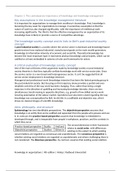Samenvatting
Knowledge in organizations - summary - Hislop 4th ed.
- Instelling
- Radboud Universiteit Nijmegen (RU)
This Knowledge in Organizations summary contains all textbook content of the new (fourth) edition of Hislop, Bosua and Helms' book. Chapters 1 - 16. Course: Knowledge management / Knowledge in Organizations
[Meer zien]







